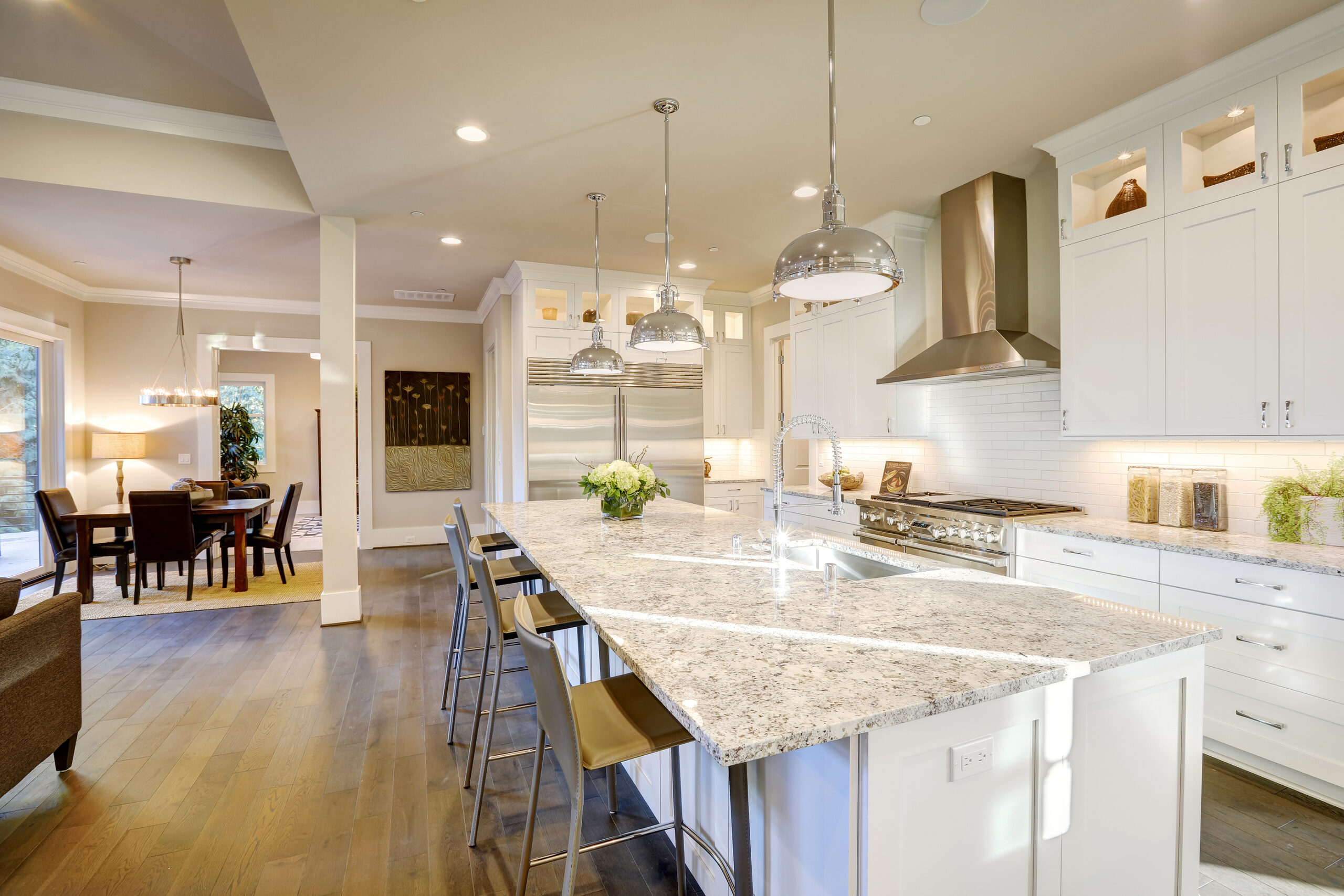
Kitchen Countertop Material Guide: Choosing the Best Surface for Your Kitchen
Selecting the right kitchen countertop material is a pivotal decision in any kitchen remodel or upgrade. The countertop serves as not only a functional work surface but also a focal point that contributes significantly to the overall aesthetic and feel of your kitchen. With a myriad of options available, each boasting unique characteristics, understanding the pros and cons of different kitchen countertop materials is essential to making a well-informed choice that aligns with your lifestyle, design preferences, and budget.
This comprehensive guide explores the most common kitchen countertop materials in detail, providing insights into their advantages, disadvantages, and considerations for choosing the best surface for your home.
1. Granite Countertops
Pros:
- Natural Beauty: Granite countertops are revered for their natural beauty, characterized by unique patterns and colors derived from natural stone. Each slab is distinct, offering a touch of luxury and elegance to any kitchen.
- Durability: Granite is a highly durable material, renowned for its resistance to scratches, heat, and stains when properly sealed. It can withstand the rigors of daily kitchen activities, making it ideal for busy households.
- Increased Home Value: Installing granite countertops is often viewed as a valuable investment that can enhance the resale value of your home, appealing to potential buyers seeking high-quality finishes.
- Heat Resistance: Granite countertops are heat-resistant, allowing you to place hot pans and pots directly on the surface without causing damage.
Cons:
- Maintenance: Granite countertops require regular sealing to maintain their resistance to stains and moisture. Failure to seal them properly can lead to staining over time, especially in areas prone to spills and splashes.
- Cost: Granite countertops can be more expensive compared to other materials, particularly for premium or exotic varieties. The cost varies based on factors such as rarity of the stone and complexity of installation.
- Weight: Due to its density, granite countertops may require additional structural support during installation, adding to the overall cost and complexity of the project.
2. Quartz Countertops
Pros:
- Consistent Appearance: Engineered quartz countertops offer a uniform and consistent appearance, available in a wide array of colors and patterns to suit various kitchen designs. This uniformity makes it easier to achieve a cohesive look across large surfaces.
- Durability: Quartz is a non-porous material, making it highly resistant to scratches, stains, and bacteria. Unlike natural stone, quartz countertops do not require sealing and are easy to clean with mild soap and water.
- Low Maintenance: Due to its non-porous nature, quartz countertops are virtually maintenance-free, requiring minimal upkeep compared to granite or marble.
- Design Flexibility: Manufacturers can produce custom colors and designs in quartz countertops, providing greater design flexibility for modern kitchen aesthetics.
Cons:
- Heat Sensitivity: While quartz countertops are generally heat-resistant, extreme heat can damage the resin used in their manufacturing process. It is advisable to use trivets or hot pads to protect the surface from direct heat exposure.
- Cost: Quartz countertops can be comparable to or slightly more expensive than granite, depending on the quality, design options, and complexity of installation.
- UV Sensitivity: Prolonged exposure to direct sunlight may cause quartz countertops to fade or discolor over time. Proper precautions, such as using window coverings or UV-protective coatings, can mitigate this issue.
3. Marble Countertops
Pros:
- Elegant Appearance: Marble countertops are celebrated for their luxurious and timeless aesthetic, characterized by distinctive veining and a polished finish that exudes sophistication.
- Cool Surface: Marble remains naturally cool, making it an ideal surface for tasks such as pastry-making and baking.
- Heat Resistance: Like granite, marble is naturally heat-resistant and can withstand the heat generated by hot pots and pans.
Cons:
- Porosity: Marble is a porous stone that requires regular sealing to prevent staining from liquids and oils, particularly acidic substances like vinegar and citrus juices.
- Scratch Sensitivity: Marble is softer and more susceptible to scratches and etching compared to granite or quartz. Careful handling and maintenance are essential to preserve its pristine appearance.
- Cost: Marble countertops are typically more expensive than granite or quartz, reflecting its premium status and the craftsmanship required to install and maintain it.
4. Solid Surface Countertops (e.g., Corian)
Pros:
- Seamless Appearance: Solid surface countertops can be seamlessly integrated with sinks and backsplashes, creating a sleek and continuous surface that enhances visual appeal.
- Repairable: Scratches and minor damages to solid surface countertops can be repaired by sanding or buffing, restoring the surface to its original condition.
- Hygienic: Non-porous and resistant to bacteria growth, solid surface countertops are easy to clean and maintain.
Cons:
- Heat Sensitivity: Solid surface countertops are not as heat-resistant as natural stone and can be damaged by hot pans or pots placed directly on the surface.
- Scratch Prone: While solid surface countertops are durable, they can scratch more easily than harder materials like granite or quartz. Using cutting boards and protective mats is recommended to prevent damage.
- Cost: Solid surface countertops are typically priced in the mid-range, making them a more affordable alternative to natural stone while still offering versatility in design and color options.
5. Butcher Block Countertops
Pros:
- Warmth and Natural Beauty: Butcher block countertops add warmth and character to the kitchen, blending natural wood grains and textures with the overall decor.
- Affordability: Generally more affordable than stone countertops, making them a budget-friendly option for kitchen renovations.
- Renewable: Unlike stone, butcher block countertops can be sanded and resealed to remove scratches, stains, and signs of wear, prolonging their lifespan.
Cons:
- Maintenance: Butcher block countertops require regular sealing and oiling to maintain their durability and prevent drying or cracking. Failure to maintain them properly can result in water damage and discoloration.
- Water Sensitivity: Wood is susceptible to water damage, swelling, and staining if exposed to moisture for prolonged periods. Proper sealing and maintenance are essential to protect butcher block countertops.
- Durability: While durable, butcher block countertops are softer than stone and more prone to scratches and dents. Using cutting boards and trivets is recommended to preserve their surface integrity.
6. Stainless Steel Countertops
Pros:
- Industrial Look: Stainless steel countertops lend a modern and sleek aesthetic to the kitchen, popular in contemporary and minimalist designs.
- Durability: Highly resistant to heat, stains, and bacteria, stainless steel countertops offer a hygienic surface that is easy to clean and maintain.
- Heat Resistance: Stainless steel can withstand high temperatures, making it suitable for kitchen environments where cooking and food preparation are frequent.
Cons:
- Scratches: Stainless steel countertops can scratch easily and show fingerprints and smudges, requiring frequent cleaning to maintain their polished appearance.
- Cost: Stainless steel countertops can be expensive, especially for custom designs and thicker gauges of stainless steel.
- Noise: Stainless steel countertops can amplify noise from clanging utensils and pots, which may be a consideration for some homeowners.
7. Concrete Countertops
Pros:
- Customizable: Concrete countertops offer unparalleled design flexibility, allowing for custom shapes, sizes, and embedded materials such as glass or decorative aggregates.
- Durability: Concrete is extremely durable and resistant to heat, making it suitable for high-traffic kitchen environments.
- Design Options: Concrete countertops can be customized with various finishes, colors, and textures to complement any kitchen style or decor.
Cons:
- Sealing: Concrete countertops require regular sealing to prevent staining and water penetration. Proper maintenance is essential to preserve the appearance and integrity of concrete surfaces.
- Weight: Concrete is heavy and may require additional structural support during installation. Careful planning and reinforcement are necessary to ensure the countertops are properly supported.
- Cost: Concrete countertops can be expensive, particularly for custom designs and finishes that require specialized craftsmanship and installation techniques.
Choosing the Right Kitchen Countertop Material
When selecting a kitchen countertop material, consider the following factors to ensure it meets your functional needs and design preferences:
- Aesthetic Preference: Choose a material that complements your kitchen’s overall design theme and personal style preferences. Consider factors such as color, pattern, texture, and how the countertop will harmonize with other elements in the space.
- Durability and Maintenance: Evaluate the material’s durability, resistance to scratches, heat, stains, and daily wear and tear. Consider how much maintenance the countertop requires, including sealing, cleaning, and repair procedures.
- Budget: Determine your budget for both the material and installation costs, taking into account any additional expenses such as maintenance products or custom finishes. Compare prices across different materials to find the best value for your investment.
- Usage Patterns: Assess how you use your kitchen on a daily basis and choose a countertop material that can withstand your cooking habits, frequency of use, and potential hazards like spills or heat exposure.
By carefully weighing these factors and understanding the pros and cons of each kitchen countertop material outlined in this guide, you can confidently select the surface that best suits your needs and enhances the functionality and beauty of your kitchen. Whether you prioritize the natural elegance of granite, the low maintenance of quartz, or the warmth of butcher block, there’s a countertop material that’s perfect for transforming your kitchen into a stylish and functional space you’ll love for years to come.
